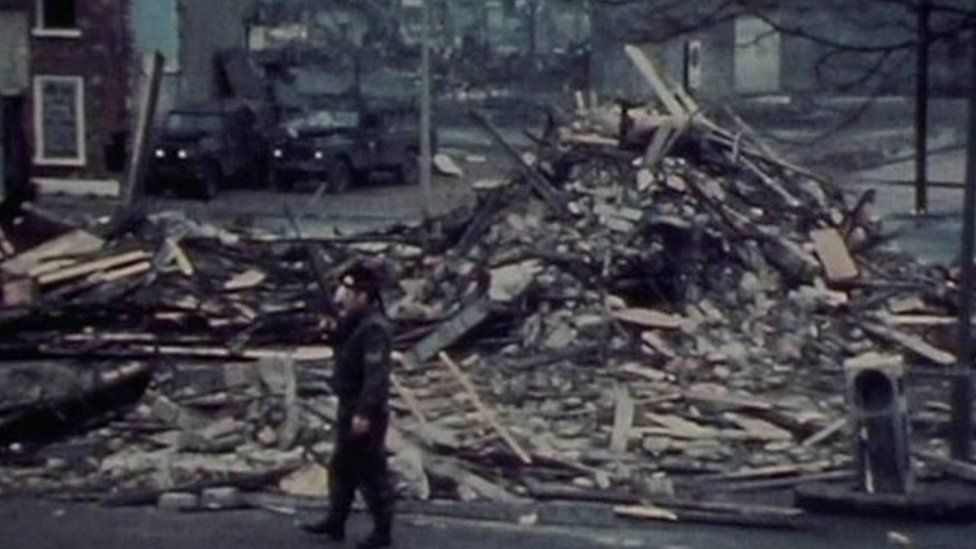
The loyalist paramilitary attack at McGurk's Bar in Belfast killed 15 people in December, 1971
Relatives of 15 people murdered in a bomb attack at McGurk's Bar have been told the case merits new inquests.
They said the attorney general told them new inquests were "advisable" after new evidence was uncovered.
The attack at McGurk's Bar in Belfast on 4 December 1971 was carried out by the Ulster Volunteer Force (UVF).
The families of those killed have for a long time said that they suspect British armed forces had advanced knowledge of the attack.
One man was convicted of all 15 murders in 1978.
The attorney general's recommendation of new inquests has been prompted by the uncovering of new evidence concerning the location of Army observation posts in the vicinity of the bombing.
However, under the terms of the Legacy Act, no further Troubles-era inquiries or civil cases can be heard from 1 May.
The deadline included in the legislation will end all future civil litigation and inquests into deaths which occurred during more than 30 years of violence in Northern Ireland, known as the Troubles.
Prosecutions that are currently ongoing will continue to conclusion, but inquests that have already begun will end in May unless they have reached the point of delivering findings.
Attorney General Dame Brenda King has written to the family of Edward and Sarah Keenan, two of those who died in the bombing.
Image source, NI Assembly
Image caption,Dame Brenda King said "it is advisable to order a new inquest"
Families told BBC News NI that Dame Brenda said she had "considered the submissions and documents provided" and "decided that it is advisable to order a new inquest into their deaths".
"Investigation of the actions or inactions of the Army in the period before the bombing occurred is incomplete," the letter stated.
Dame Brenda wrote that it was "apparent from the copies of the military logs shared with the attorney that there were military observation posts near to the area where the Keenans met their deaths".
"The attorney considers that an inquest would provide a forum in which the actions of the Army prior to the bombing could be explored," the letter added.
In the immediate aftermath of the attack, the IRA was blamed for the bombing, but this was later disproved.
In 2011 the Police Ombudsman found there had been no collusion between the Royal Ulster Constabulary and loyalist paramilitaries, but concluded there was investigative bias towards blaming republicans.
New evidence was submitted to the attorney general by Ciarán MacAirt, whose grandmother Kathleen Irvine was murdered in the attack and whose grandfather John was badly injured.
Image source, Pacemaker
Image caption,Ciarán MacAirt submitted new evidence to the attorney general concerning the bombing
In a statement, Mr MacAirt said he had discovered the evidence "through archive research in public records and targeted requests via the Freedom of Information Act".
He said said the families would "continue to fight for equal access to due process of the law".
Gerard Keenan, who was 13 when the bombing killed both of his parents, welcomed the attorney general's letter.
Gerard Keenan was 13 when the bombing killed both of his parents
"All the families have campaigned with great dignity for over 52 years for scraps of truth and justice from the British state," he said.
"Like many other bereaved families now, though, we face the reality that the British state will not allow this inquest to go ahead."

 1 week ago
1 week ago
.png)









